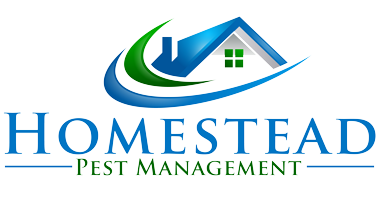5 Reasons for Winter Pest Control
It’s a common misconception that with the cold weather rolling in, familiar pests of warmer months have simply left us until next year. The truth is in the colder months, crawling insects and other pests that don’t go dormant in the winter can make their way into our homes and draw in mice and other rodents, looking for warmth. Additionally, winter in Tennessee bring their own set of insects and other pests to stay on the lookout for.
Here are five reasons why Homestead Pest Management is essential during the cold weather months:
Additional Tips:
- Mice and rats. Mice and rats require only a tiny opening or crack to gain entry into your home. They can enter through your attic and gnaw on the wires, wood beams, electrical wires and insulation.
- Wood destroying insects. Carpenter ants and termites destroy the home from the inside out, so you really never see the damage until it is too late. If you find carpenter ants indoors during the winter, it is an indication that they are nesting inside walls, floors or decaying wood.
- Sealing your home. The early winter is the best time for Homestead Pest Management’s pest control team to find all the new openings before mice seek shelter in your home or business. They will check the areas where utilities and pipes enter the home. A mouse can fit through a hole the size of a dime.
- Dormant insects. Many insects will hide in the attic or basement in late fall and early winter to escape the frigid winter temperatures. Spiders, cluster flies, Asian lady bugs and other bugs will remain dormant until spring. Then as the weather warms, they can easily find their way into your living spaces. By hiring Homestead Pest Management to apply a preventative treatment in these key hiding spots, it will repel insects as the weather warms.
- Spider webs and nests. Removing webs, nests and egg cases may help prevent pests from reemerging in your home when the weather becomes warmer. Some creatures are hardwired to return to certain places, but if you get rid of all the reasons for them to return, you increase the probability that you’ll finally be saying a permanent “goodbye” to them.
- Replace loose mortar and weather stripping around the basement foundation and windows.
- Store firewood at least 20 feet from the home. Mice and ants can make their nests in wood piles and easily gain access to your home if the pile is nearby.
- Rodents can hide in clutter, so keep storage areas well organized, and store boxes off of the floor.
- Eliminate all moisture sites, including leaking pipes and clogged drains. Extra attention should be paid to kitchens and bathrooms as these areas are particularly vulnerable to cockroach infestations.
- Install door sweeps and repair damaged screens in windows.
- Screen vents to chimneys. Keep attics, basements and crawl spaces well ventilated and dry.
Residents of Tennessee appreciate the distinct seasons we have; however, drastic changes in weather can occasionally wreak havoc on our homes. Cracks in the foundation are the perfect place for pests to make their way into your warm, inviting home.
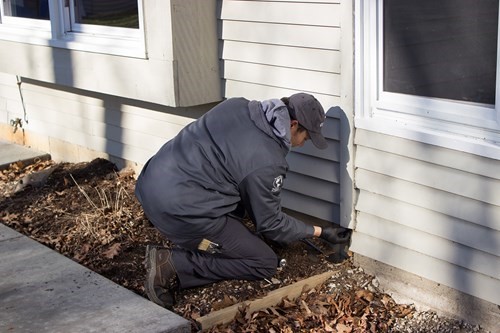
Fall and winter pest services are targeted at your home’s interior. One of the first things that our team looks for is anything that has changed since their last visit. It’s extremely common for a Homestead Service Specialists to find new openings that didn’t exist at their most recent visit. They’ll also check out any rodent protection equipment that they’ve put in place. This will help to indicate if there is any new rodent activity, and where it might be coming from.
Homestead residential services are tailored to the homeowner’s individual needs, and in winter, our trained service experts focus primarily on the interior of the house, searching for any openings where pests could enter. Our Service Specialists will notify the homeowner if any such openings are located, and seal those openings to ensure pests remain outside. In the meantime, spider webs will also be knocked down and cleaned out in the home’s interior. Your pest control expert will also target your home’s basement for a preventative pesticide treatment for crawling insects.
Our clients are left with a detailed inspection report, outlining the things that they’ve observed and if applicable, an action plan moving forward.
Don’t mistake winter as a time to lay off on the pest control services – It allows you preparation time for the warm seasons ahead! Homestead Pest Management is your trusted pest control expert. Call 731-422-2643 or fill out our form today to contact Homestead Pest Management about your winter pest control needs.
5 Troublesome Wintertime Pests
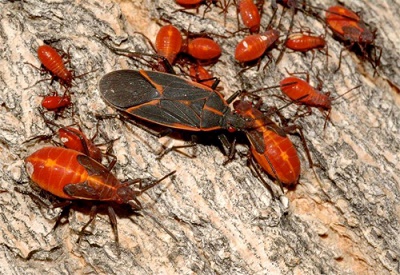
According to the Institute of Real Estate Management:
“Building owners and managers must be on the lookout for five winter pests. The first is the box elder bug. Such pests feed on the little “whirlybird” seeds that are released from box elder and maple trees in the fall. When colder temperatures hit, they like to find a nice warm spot to hunker down for the winter. Box elder bugs are only a half inch long, so finding a way into most buildings is pretty easy. Look for them just inside the exterior walls of your building, on the warm sunnier side. Then, to stop these pests, all exterior cracks and crevices must be sealed. In addition, exterior doors must be sealed tightly on all sides. Cluster flies are the second winter pest to guard against. They tend to cluster in large numbers and come inside when winter arrives. To combat them, air handling and exchange units must be maintained with proper filters that prevent these pests from entering the airflow. Additionally, filters must be properly fitted within the unit to prevent bypassing. Asian multi-colored lady beetles are a potential third pest problem. They are often found in buildings during the winter, moving in groups, and releasing a smelly, yellowish liquid that can stain wall and ceiling coverings. Entrances must be fitted with brushes, gaskets, air curtains or other devices as appropriate to ensure that such insects cannot crawl or fly into the building.
A fourth pest to fight off now that it’s cold is the brown marmorated stink bug. Such pests, when disturbed, release a strong, foul order to the point where the surrounding area can be rendered unusable. The article’s author urges that all exterior doors and windows be kept closed or properly screened when open. In addition, the most effective means of removing these pests is by vacuuming occupied areas. Finally, be on the lookout for common house mice. Removal typically requires an effective trapping program.”
At Homestead Pest Management, we can help you to get rid of these and other pests, then design your plan for ongoing maintenance of your pest-free status. Contact us today to get more information or to schedule a personalized assessment of your home and/or property.
Fall and Winter Pest Control Tips
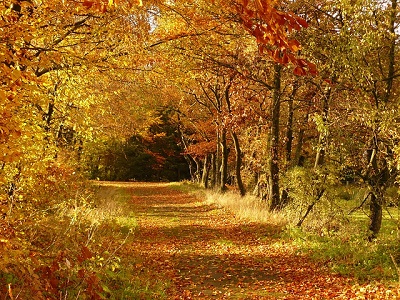
During the fall and winter months, you won’t be paying as much attention to the outside of your home as you do during the spring and summer.
The weather is cooling down, leaves have fallen off the trees, and plants and other landscaping needs are not as critical.
However, failing to properly maintain the outside of your home this time of year can create an open invitation for many different types of pests, especially as they seek to stay warm inside your home during the cold winter months.
Fall Bugs & Pests
Fall bugs are abundant – as the seasons change, you’ll see pests coming and going.
Overwintering pests start making their way inside for shelter, while “summer” bugs, like flies and stinging insects, linger.
Continue reading
Termite Control for your Home
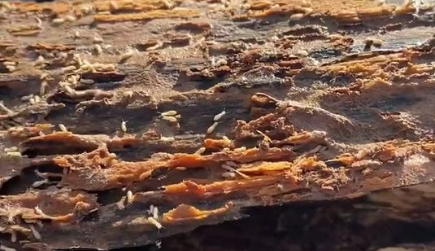
One of many pest nightmares homeowners must protect their investment against is termites. In the same order as cockroaches, termites literally eat away at dead plant materials. While they play an important role in nature, in homes, they cause the average homeowner a $3,000 repair. For termite treatment and pest control in West Tennessee, Homestead Pest Management will provide effective, thorough and prompt service. Here is some more information about termites and termite control services.
About Termites
Often mistaken or nicknamed ‘white ant,’ termites are not in the same group as ants. In fact, some ant species are predators of termites. Termite colonies consist of a fertile male (‘king) and at least one fertile female (‘queen’). The remainder are usually sterile termites and divided into workers or soldiers. In nature, their ability to recycle plant materials is important to the ecology of the Earth. Colonies can be as small as a few hundred to several million from eggs, nymphs, and adults. Queens live the longest in the colony, with lifespans reported between 30 to 50 years.
Signs of Termite Damage
Termites are invasive and silent pests. They can be eating away inside the bones of your home for years before becoming suspected. With the weather we experience in Tennessee, termites are active year-round. Some signs of termites include winged swarmer events, mud tubes on foundations or basement walls, damage to wood siding or studs, or even warping in ceilings, walls or floors. When doing any renovations, always look for signs of termites in studs by knocking on the beam. If it sounds hollow, you may have a problem.
Homestead’s Termite Control Service
If you suspect termites, whether you see damage to wall trim or experience a swarm of flying termites in your home, a professional inspection is crucial. Call us to visit your home for a professional inspection, we will crawl into the small spaces in your home, listen to your concerns, and provide information for you to make an informed decision. While many pest control professionals use toxic sprays or chemicals, Homestead prefers to use a termite baiting system. It is the green way to treat your home and is very effective. If you prefer a liquid barrier, Homestead also offers a liquid treatment.
As your pest control company, Homestead Pest Management offers monthly and quarterly services. Call for a free inspection today at 731-422-2643!
Get Rid of Your Thankless Pests with Homestead Pest Management of Jackson, TN!

Homestead Pest Management, Inc. proudly has served the residential and commercial communities of West Tennessee with expert pest control services since 1976. This family owned and operated business began over 30 years ago and has pioneered many techniques and organizations dedicated to quality pest control. We know how important it is for your home to be safe and pest-free particularly during the Thanksgiving and Christmas holidays when our homes are swarming with family and friends. We can take care of any pest problem you might have!
Homestead Pest Management has a team of State Certified technicians who undergo continuous training to stay on top of the latest techniques and developments that affect our field and enhance our effectiveness against pests. We strive to provide our customers with the best quality service for their individual needs, at the most affordable price for their budget. We are your neighbors, and your communities are our communities – we will treat you right!
If you need a consultation, an assessment, or any of our services, contact us today and let us make your holidays even happier!
Banish Moldy Oldies in your Home this Fall with HPM

Crawling insectoid pests are not the only things that you need to protect your home from – mold and mildew from excess moisture in, under, or around your home can be a costly problem that can cause damage to your home and bring illness to your family.
According to Energy.gov:
“Properly controlling moisture in your home will improve the effectiveness of your air sealing and insulation efforts, and these efforts in turn will help control moisture. The best strategies for controlling moisture in your home depend on your climate and how your home is constructed. Proper ventilation should also be part of a moisture control strategy.
Before you decide on a moisture control strategy, it helps to understand that moisture or water vapor moves in and out of a home in three ways:
- With air currents
- By diffusion through materials
- By heat transfer.
Of these three, air movement accounts for more than 98% of all water vapor movement in building cavities. Air naturally moves from high-pressure areas to lower pressure areas by the easiest path available — generally through any available hole or crack in the building envelope. Moisture transfer by air currents happens quickly, and carefully and permanently air sealing any unintended paths for air movement in and out of the house is a very effective moisture control strategy.
The other two driving forces — diffusion through materials and heat transfer — are much slower processes. Most common building materials slow moisture diffusion to a large degree, although they never stop it completely. Insulation also helps reduce heat transfer or flow.
The laws of physics govern how moist air reacts in various temperature conditions. The temperature and moisture concentration at which water vapor begins to condense is called the “dew point.” Relative humidity (RH) refers to the amount of moisture contained in a quantity of air compared to the maximum amount of moisture the air could hold at the same temperature. The ability of air to hold water vapor increases as it warms and decreases as it cools. Once air has reached its dew point, the moisture that the air can no longer hold condenses on the first cold surface it encounters. If this surface is within an exterior wall cavity, the result is wet insulation and framing.
In addition to air movement, you also can control temperature and moisture content. Insulation reduces heat transfer or flow, so it also moderates the effect of temperature across the building envelope cavity. In most U.S. climates, properly installed vapor diffusion retarders can be used to reduce the amount of moisture transfer. Except in deliberately ventilated spaces such as attics, insulation and vapor diffusion retarders work together to reduce the opportunity for condensation in a house’s ceilings, walls, and floors.”
Homestead Pest Management of West TN has always offered vents, drains and plastic barriers as options for moisture prevention underneath your house to keep mold or fungus from developing. Contact Homestead Pest Management today to have a free underneath home inspection and get informed about all the moisture protection options applicable to your home. We are your West TN pest control experts, and we are here to help with all your pest control needs!
Moisture in your Crawl Space?
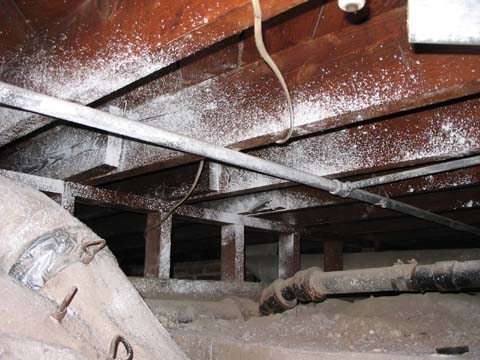
Do you have floor joists in your crawl space that look like the one to the right? When you do, you’ll notice the ‘furries,’ as one of my friends called the microbial infestation growing on that wood. What’s going on here? Why is stuff growing on the wood down in the crawl space?
Well, it might be mold and here’s what’s necessary for it to grow:
- Spores – They’re everywhere and will grow if the other conditions are met.
- Appropriate temperatures – They like pretty much the same temperatures we do, and even colder. Ever seen mold in your fridge?
- Food – Organic matter is what they like, and it’s everywhere. Mold likes cellulose (wood) and the more processed, the better. Paper is called mold candy by people who work in this field.
- Moisture – To sustain growth, a mold colony must have water. When the relative humidity of the air is 70% or higher, mold has enough water to grow.
So, of the four requirements for mold growth, the one we have most control over is moisture. Keep the materials and the air dry enough, and we won’t have a mold problem.
Have you measured the relative humidity in your crawl space? When I was doing improvements on homes, I’d install a digital thermo-hygrometer with a remote sensor in the crawl space so the homeowners could track the relative humidity. If you’re not doing this yet, and you have a crawl space, get yourself one of these devices now.
OK, so you’ve measured and determined that you do have high relative humidity in your crawl space. That’s not unusual at all, especially in a humid climate like we have here in the Southeast. Where’s the moisture coming from? And why is the humidity in a vented crawl space higher than the outdoor relative humidity? Here are three reasons.
1. Bulk Water
The first problem to look for is bulk water. If there’s standing water in your crawl space, you have either a drainage problem or a plumbing leak. You need to fix this immediately. Having a pond under your home is a bad, bad idea.
In the photo above, the problem was that the back yard sloped down to the house, bringing water up to the foundation wall. Since it was just a crawl space, the builder didn’t put any kind of water proofing on the concrete block or grade the yard properly to keep the hydrostatic pressure from building up against the block wall. You can see the result here. This was a new house with a serious bulk water problem. The joists were already growing stuff, and the fiberglass batt insulation was getting heavy and falling down.
2. Moisture Evaporating from the Ground
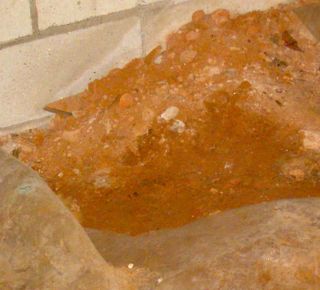
In the photo above, the ground was partially covered with a polyethylene vapor barrier. The dirt that wasn’t covered looked dry, but when I pulled the plastic back, I found that there was a lot of moisture in that soil. The soil that looked dry only looked that way because it was constantly evaporating moisture into the air of the crawl space. The foundation walls can also evaporate moisture into the air.
What do you do to solve the problem? Cover it all up with a vapor barrier!
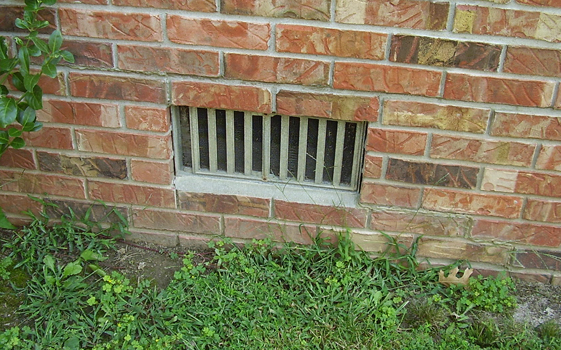
3. Outdoor Air Coming in through the Crawl Space Vents

Some people find this hard to believe, but when you bring outdoor air into the crawl space, the relative humidity actually increases. Think about it this way: When air enters the crawl space, it cools down. Cool air cannot hold as much moisture as warm air, so the air that enters is now closer to its saturation point (which we call the dew point). It might’ve been 60% relative humidity outside (relative to a temperature of 90° F, say), but when that air came into the crawl space and cooled down to 75° F, the relative humidity jumped up to 95%. Not good!
The numbers here come from the psychrometric chart (invented by Willis Carrier, the inventor of the modern air conditioning system), which relates temperature and humidity of air.
What Can You Do?
If you’ve got a vented crawl space with high relative humidity caused by one or more of the above, to solve the problem, you’ve got to remove the causes. Bulk water is solved by fixing the drainage or plumbing problems. Water evaporating from the ground or coming through the vents can be fixed by encapsulating your crawl space.
One thing that does NOT work is to try to treat the symptom by installing a dehumidifier. Don’t do that!
Summer Critters
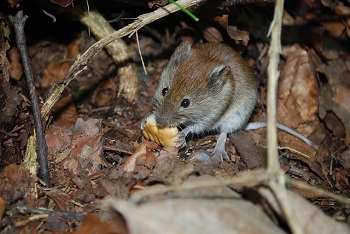
In the midst of the warmer months of the year there is not much concern of pests that typically invade during the winter. After all, there is a lot of time to be spent on the lake, gardening and other fun-filled summer activities to pursue. But did you know that even when the weather is warm outside, rodents may still be trying to get into your home?
Although typically more of an issue in the winter when they need a warm place to reside, mice and rats are still in search of food during the summer which means they can still invade your home. When it comes to rodent infestations there are many concerns that should be considered even when the sun is shining and the warm weather abounds.
Gnawing on furniture, structures of the home, personal belonging, food packaging
Leave urine and droppings which leads to contamination
Can transmit diseases through droppings and biting
Cause fire hazards from chewing on electrical wiring
Can introduce other pests into the home such as fleas and mites
Clearly, rodents do not make good house guests regardless of the season and if you have been distracted by the long summer days (which let’s face it, we all have), it is possible that mice and/or rats may find their way into your Midwest home. Thankfully for homeowners, there are rodent prevention techniques as well as professional pest control services that are designed to keep mice and rats from breaking and entering no matter what time of the year.
For residents who are living in the West Tennessee area including Jackson, Lexington, Milan and throughout our large service area, Homestead Pest Management is prepared to help protect your home from mice and other rodents. With our trusted home pest control services you can set your worries aside and rest assured our experienced team will get rid of rodents and many other common household pests. To learn more or to schedule your pest control service, please give us a shout today!
We are Thankful for you!

Yellow Garden Spider
Watch as Jeremy from Homestead Pest Management explains a little about the VERY LARGE Yellow Garden Spider!
